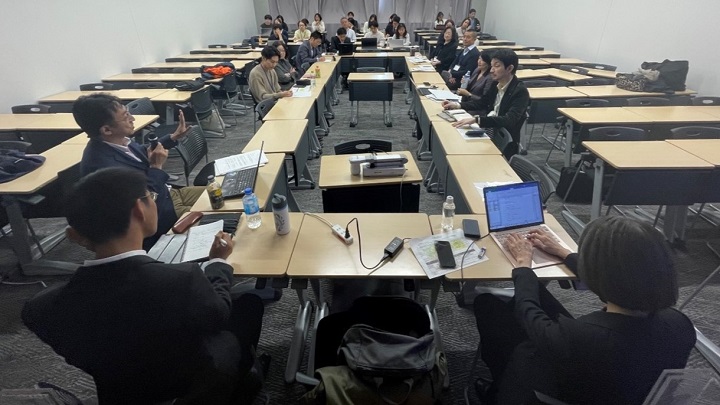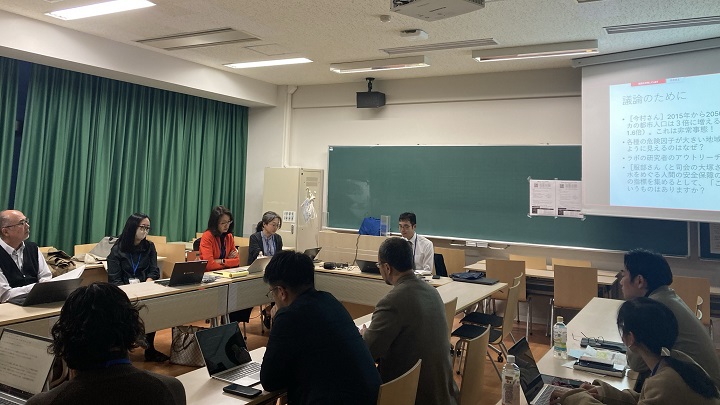Presentations by Researchers from the JICA Ogata Research Institute at the JAHSS & JASID Joint International Conference 2024 (Part 1: Human Security)
2025.01.15
From Nov. 9–10, 2024, the 35th Annual Conference of the Japan Society for International Development (JASID) and the 14th Annual Conference of the Japan Association for Human Security Studies (JAHSS) were jointly held at Ichigaya Campus, Hosei University, and the JICA Ogata Sadako Research Institute for Peace and Development (JICA Ogata Research Institute). In an increasingly destabilizing world, how can a society that leaves no one behind and protects the dignity of each individual be realized? What roles can international cooperation play in doing so? With these questions as the conference theme, a variety of discussions took place.
In the plenary session titled “International Cooperation and Human Security in an Era of Uncertainty,” Tanaka Akihiko, President of JICA, gave a lecture. Introducing Working Paper No. 91 “Toward a Theory of Human Security ” by the JICA Ogata Research Institute and touching on the interaction between “physical, living and social systems”, he explained the need for studies on human security that understand the emergence of threats through comprehensive and interdisciplinary system analysis.
Researchers from the JICA Ogata Research Institute held roundtables on human security. A summary of each of these roundtables is shared below.
Saito Kiyoko
, Senior Research Fellow, Muto Ako
, Specially Appointed Research Fellow, and Orita Tomomi
, Principal Research Fellow, together with Professors Ishiguro Itaru, Rikkyo University, and Muramoto Yukiko, The University of Tokyo, provided a new perspective to conventional labor migration theories. More specifically, from the perspective of human security, they showed the uniqueness of labor migration in Asia.
In previous studies, labor migration was understood as voluntary migration that is based on the strong aspiration and capability of individuals. However, the research project “International Migration Routes and Route Selection Mechanisms
,” focused on how this “voluntariness” is formed through relationships with communities within the Asian context. From a field study in Indonesia, the project has theoretically proposed the possible existence of coerciveness that is different from European models that are based on decision making led at the individual level. Such insight freshly visualizes systemic vulnerability that migrants are confronted with and urges readers to reconsider the optimum balance between protection and empowerment in development cooperation. When the floor became open, the possibility for applying this theoretical review to practice was discussed. High hopes for contributions to development-cooperation practice through the construction of an Asian model for labor migration were expressed from the floor.
Orita, Muto, Shiga Hiroaki
, Visiting Fellow (also a professor at Yokohama National University), Sugitani Kota, Part-time Research Assistant, Sato Jin
, Visiting Fellow (also a professor at the University of Tokyo), and Takeuchi Kaito
, Research Fellow, held a roundtable that focused on the relationship between state security and human security. Based on “Human Security in the Post-Post-Cold War Era
,” "Natural Disasters in Conflict Situations
” and “Human Security and Gender,” which are three essays published in the second issue of ”Human Security Today
,” a report by the JICA Ogata Research Institute, they discussed the challenges in realizing human security in a time when state security is attracting more interest.
When the floor became open, active discussion took place. Topics included the recognition of layers between state and human security to link the two, the tension between the policy level and ground level, and measures that not only respond to the emergence of human security threats but also make preventative actions the mainstream. In addition, based on the accumulation of case studies, the need for research to build theories for practicing human security, such as the categorization of threats, was shown.

Roundtable on the relationship between state security and human security
Mine Yoichi
, Executive Director, held a discussion focusing on the relationship between human security and water resources together with Imamura Tadatsugu, JICA Expert (Infectious Disease Control), Dohi Yuko, Senior Advisor, Governance and Peacebuilding Department, Nomura Marika, Senior Advisor, Human Development Department, Hattori Yoko, Director, Operations Strategy Department, and Otsuka Takahiro, Deputy Director, Water Resources Group, Global Environment Department, all from JICA. The connection between threats to human security in the fields of infectious disease control, peacebuilding, and nutrition and water resources, was shown. Discussion on ways to address compound threats from the perspective of development cooperation followed.
From the perspectives of development cooperation practitioners, it was noted that the act of looking at development cooperation in water-related areas from a human security perspective can be summarized as the following: identifying threats, working on protection and empowerment, and formulating strategies for solidarity. The roundtable added that when doing so, it is important to consider the downside risk. Furthermore, unique features of water resources were pointed out. The first was the relevance with the three value elements of human security—lives, livelihoods and dignity—and the second was the possible role as an important element in understanding crises within the interaction between “physical, living and social systems,” which was explained in the working paper by Tanaka.

Participants discuss the relationship between human security and water resources.

事業事前評価表(地球規模課題対応国際科学技術協力(SATREPS)).国際協力機構 地球環境部 . 防災第一チーム. 1.案件名.国 名: フィリピン共和国.

事業事前評価表(地球規模課題対応国際科学技術協力(SATREPS)).国際協力機構 地球環境部 . 防災第一チーム. 1.案件名.国 名: フィリピン共和国.

事業事前評価表(地球規模課題対応国際科学技術協力(SATREPS)).国際協力機構 地球環境部 . 防災第一チーム. 1.案件名.国 名: フィリピン共和国.

事業事前評価表(地球規模課題対応国際科学技術協力(SATREPS)).国際協力機構 地球環境部 . 防災第一チーム. 1.案件名.国 名: フィリピン共和国.

事業事前評価表(地球規模課題対応国際科学技術協力(SATREPS)).国際協力機構 地球環境部 . 防災第一チーム. 1.案件名.国 名: フィリピン共和国.